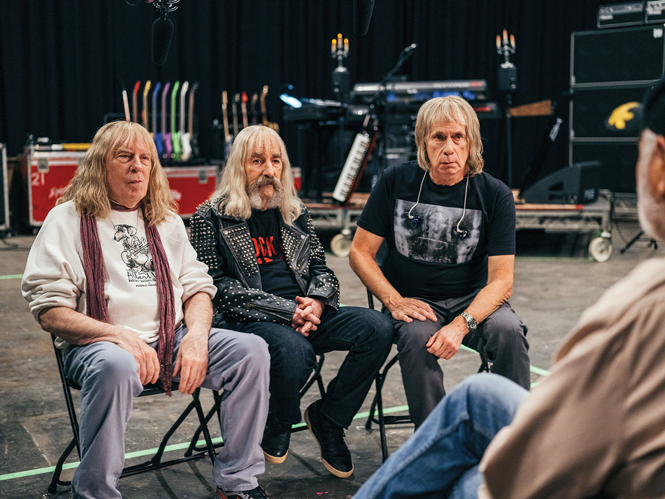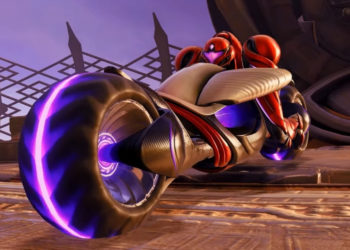On July 5, a couple of days after I saw Spinal Tap II: The End Continues, Black Sabbath played its final show, at Villa Park, in Birmingham, England. Not only are these two phenomena related; they seem to have been impishly synchronized: Just when the troupe behind Rob Reiner’s This Is Spinal Tap, the mockumentary that satirically exploded the genre of heavy metal, reunited after four decades for a sequel, the band that invented heavy metal called it quits.
And then, two weeks later, Ozzy died: Ozzy Osbourne, Sabbath’s front man, who at Villa Park had sung sitting down, enthroned on what looked like a satanic office chair, heroically managing a host of ailments (including Parkinson’s disease). No one was more metal than Ozzy. At the same time, no one in metal was funnier, more in touch with his own bathos, more post–Spinal Tap, in a sense, than Ozzy, especially in his shambling-paterfamilias incarnation on MTV’s reality show The Osbournes. At Villa Park, his frailty was epic, defiant, even as his bandmates labored drastically to summon the power of 50 years earlier. Still, Sabbath sounded amazing, the band’s distinctive vibe of limitless cosmic encumbrance, of Man squirming under the thumb of Fate, God, madness—the essential heavy-metal vision—somehow magnified by the venerable wobbliness of its playing.
Spinal Tap II (which arrives in theaters on September 12) also concerns itself with last things. As the movie (again directed by Reiner) begins, Spinal Tap the band—ultra-English, ultra-deluded as to its own quality and status, basically a slavish amalgam of every trend in hard rock since 1966—is no more, its members long dispersed and out of touch with one another. Lead guitarist Nigel Tufnel is the proprietor of a guitar-and-cheese shop; guitarist-vocalist David St. Hubbins makes on-hold Muzak and soundtracks for true-crime podcasts; bassist Derek Smalls runs the New Museum of Glue. But upon the death of Ian Faith, Tap’s posh-sounding, cricket-bat-wielding manager, his daughter, Hope (Kerry Godliman), inherits from him a contract for one last Spinal Tap show. Initially underwhelmed by this concept, Hope happens to catch a clip of Garth Brooks sound-checking with a Spinal Tap song. The clip has gone viral; people love it; Tap has accidentally re-impinged on pop consciousness. There’s money to be made. She must get the band together again for a final outing, for a grand farewell fling. She books the Lakefront Arena, in New Orleans.
This Is Spinal Tap was an almost-clinical study in anticlimax, in rock-and-roll humiliation. Again and again, the band falls (petulantly, peevishly, with English accents and English swear words) into the gap between its bombastic self-image and the facts on the ground, the dwindling ticket sales and tiny sandwiches and spontaneously combusting drummers. The world is against the members of Spinal Tap: Everything undercuts them; everything ironizes them. Their way to rock-and-roll sublimity, to headbanging apotheosis, is comprehensively barred.
And as dead-on comedies will sometimes do, the movie claimed a piece of reality. After This Is Spinal Tap, any band, in any genre, could have a Spinal Tap moment: taking a wrong turn on the way to the stage, being caught out by malfunctioning gear, suffering through an in-store appearance. For musicians, and metal musicians in particular, it was a new and liberating form of self-awareness.
Does the world need another Spinal Tap movie? Obviously not, no more than—inside the movie—the world needs another Spinal Tap concert. But the redundancy, the extraneousness, is exactly the point here. Prior to their reanimation by Hope and her magic contract, the Tappers are in a state of almost-hysterical obsolescence. The cheese, the Muzak, the glue museum—they’re all doing, with complete conviction, completely useless things. They are post-rock, post-culture, post-history in a sense. An inferno of triviality. A cameo by Elton John, along with glancing appearances from Metallica’s Lars Ulrich and the Red Hot Chili Peppers’ Chad Smith, contributes to the sense of the movie as an End Times in-joke. And we’re all in on it.
I don’t want to argue that rock and roll is over, its teleology exhausted, its glorious arc attenuated and made vague by Spotify and nostalgia and stylistic recyclings and concert tickets that cost $400 and blah blah blah—I’d die if I really believed that. But it certainly feels over. (For the definitive account of this feeling, and the reasons for it, read Simon Reynolds’s Retromania: Pop Culture’s Addiction to Its Own Past.)
Next question: Is Spinal Tap II funny? I’ll give you a qualified yes. The sensation of a new comic universe popping into being is absent, because you can do that only once, but the original elements are still vital: the luminous deadpan stupidity of Nigel Tufnel (Christopher Guest), the wheedling vanity of David St. Hubbins (Michael McKean), the spacey sentimentality of Derek Smalls (Harry Shearer). These are great comedians, working up their scenes, as before, from hours of improv. There’s some lovely in-studio bickering as Tufnel and St. Hubbins lock horns over a complex new musical arrangement. (St. Hubbins: “Why is it so hard for you to grasp?” Tufnel: “I’m grasping it! And my fingers are saying … don’t.”) Also, as before, the occasional shamelessly scripted gag. St. Hubbins, in his solo career, is working on the soundtrack for “a horror movie that takes place in a retirement community. It’s called Night of the Assisted-Living Dead.” We learn of a new addition to the dark lineage of deceased Spinal Tap drummers—Skippy Scuffleton; cause of death: sneezing fit—and we watch the band rustically keening its way through a folk song: “I loved me a lass whose hair was long / And brown as the finest stew.”

Speaking of drummers, Valerie Franco—hired in the movie for that final gig at the Lakefront Arena—is almost too good. Driven by her smooth and emphatic playing, Spinal Tap comes close to losing its special lumpy Tap groove, its farcical Deep Purple mega-thump, and begins to sound disconcertingly like a proper band. But it’s okay, because here comes the cameo of cameos: Paul McCartney! He wanders into the rehearsal studio with his long Liverpudlian face and ironic O-mouth, takes Tufnel’s side in the aforementioned musical dispute, and then sits down with the band for—yes!—a full-length version of “Cups and Cakes”: “Cups and cakes, cups and cakes / Oh what good things Mother makes.” It’s a number from Tap’s psychedelic infancy, and—in its pastiche-y, chamber-musicky way—wonderfully McCartney-appropriate: It’s like “Martha My Dear” written by … Spinal Tap.
Last question: Will Spinal Tap II put a dent in actuality, refine the consciousness of musicians, in the same way as its predecessor? Time will tell. With my own eyes, I have seen the uncanny afterlife of This Is Spinal Tap. I have witnessed the movie creating, as it were, new scenes for itself, new great lines. In 2006, for example, I saw Iron Maiden, perhaps the most potently theatrical (and ultra-English) heavy-metal act ever, at an arena in Boston. At one point in the set, during a characteristically epic, multipart number, the music turned moody and the stage blacked out. From up in the rafters, a single spotlight coldly blazed. Its unfortunate operator, however, couldn’t seem to find his target. His beam wavered on a patch of blankness, or the corner of an amp, and then began to roam the stage in desperation, scanning here and scanning there—until, from the darkness, the voice of Bruce Dickinson, Iron Maiden’s singer, was heard. “I’m over here,” he said dryly. “On top of the speaker. Twat.”
*Lead-image sources: Bleecker Street; Album / Alamy; United Archives GmbH / Alamy; rapid eye / Getty
This article appears in the October 2025 print edition with the headline “This Was Spinal Tap.” When you buy a book using a link on this page, we receive a commission. Thank you for supporting The Atlantic.
The post This Was Spinal Tap appeared first on The Atlantic.




